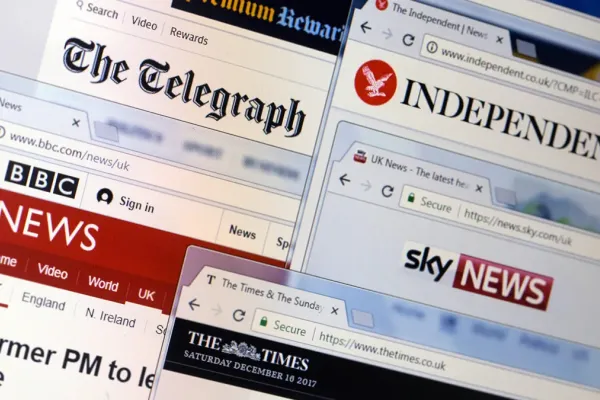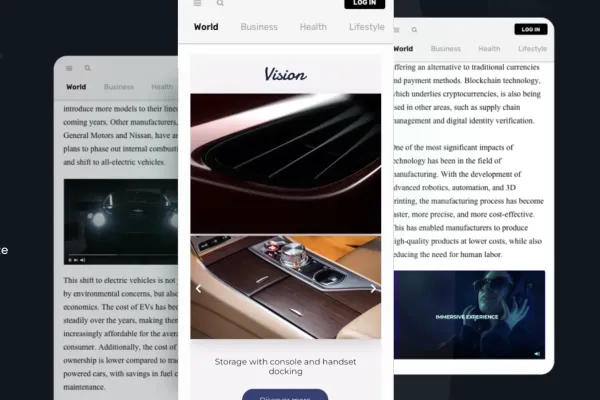 Details
Details
This article is part of a series of interviews that NAI has conducted with the directors of publisher’s Native Ad Studios around the world.
Please reach out if you want to add your Native Ad Studio to the series.

In 2015, BBC launched its in-house creative studio, BBC StoryWorks. The reasoning behind setting up the content studio was the realisation that content partnership and content marketing was growing in importance for BBC and its relationship with their commercial partners.
“It reached a point where we needed to have a full team that could service those relationships and make the most of the opportunity for content partnerships. We have always had content partnerships, but with the rise of native advertising, in 2015, it was time to have a full division,” says Richard Pattinson.
He has been BBC StoryWork’s Senior Vice President since its beginning. Prior to this, he was involved in the editorial side of BBC.
And according to Richard Pattinson, it still makes perfect sense to have a full team dedicated to branded content and native advertising. It is only becoming more important.
We require that it is of interest to the audience and gives them something of value.
RELATED: The New York Times makes some of the best native advertising. Here's why.
Native with newsroom values
BBC StoryWorks calls itself ‘The creative studio with newsroom value” and for Richard Pattinson, these newsroom values are integrated in more than one way.
“It is partly about being agile in term of how you promote the content. Being able to be responsive and reactive in a way that a newsroom is. But also in understanding the things that our audiences are really interested in.
We have more than a billion page views a month on bbc.com outside the UK and we have this huge pool of data about the kind of content that is engaging. So we understand the kind of approach we need to engage the audience.”
Here, Richard Pattinson’s background in the editorial also plays an important role.
“I have a really good understanding of the kind of content that our audience appreciates and a good understanding of how, when we create commercial content, we should use that knowledge with the editorial work, leveraging that knowledge into the work we are doing with our commercial partners.”
Being part of the BBC also means that there are rules regarding the quality of the content.
“We require that it is of interest to the audience and gives them something of value. And we don’t produce native advertising that is not doing that.
So that is quite like our news values; presenting commercial content to our audience that is clearly labelled as being commercial content, but nevertheless will feed our audiences’ curiosity.”
Native advertising should, however, absolutely not be mistaken for journalism, but Richard Pattinson points out that branded content and native advertising can be just as informative as a piece of journalism.
But there is a strict church/state-separation at the BBC as well, and at BBC StoryWorks they do not use the news journalists to create the content.
“The editorial team will approve the content. But no, they do not create the content,” Richard Pattinson underlines.
I don’t believe that there’s a resistance to really high-quality video storytelling.
READ MORE: What Is Native Advertising? The Ultimate Guide
What sets BBC apart
Regarding the unique selling points of BBC StoryWorks, Richard Pattison points to BBC’s reputation.
“I think that we, at the BBC, have a reputation to be amongst the world’s best storytellers, particularly in the broadcast space. We have been around since 1922, so we’re almost a hundred years old, and I think people associate the BBC with really high-quality storytelling.
So that is something we obviously bring to our audience at a scale with what we do at BBC StoryWorks. Video is an important part of that and we think we have the experience and knowledge that very few of our competitors do.”
Video is thus an important part of BBC StoryWorks, and even though video has been somewhat criticized for being a format that the advertisers love more than the audience, Richard Pattinson is convinced that the audience appreciates video. If it is really high-quality video storytelling, that is.
“The content itself has to tell interesting stories to our audience in a style we think they will appreciate. So I think that the appetite for that kind of content is growing. I don’t believe that there’s a resistance to really high-quality video storytelling,” he says.
Video is not always right, but when it is right, it is very effective.
Video is great – but not always right
But, underlines Richard Pattinson, video isn’t always the right answer.
“There are stories that you’d want to tell or audience you’d want to reach where you’d want to choose another medium than video. So it’s not always an option. Sometimes you’d want to do a mix of different content formats, but it always depends on the stories you want to tell.”
As an example, Richard Pattinson points to an editorial piece of content from BBC Earth called “Your life on earth”.
RELATED: How Nemorin Creative Copes With the Challenges of Branded Videos
“They did a sort of interactive feature where you type in your date of birth, your weight, and your height. Then the story would tell you what happened on the planet since you were born, and what has happened to your body. So the raw data is there, but what the story produces is something that is bespoke and unique to you.
That is a really engaging way to tell data, but obviously, you could not do that through video. So you always need to think of a creative way of executing a particular piece of content. So no. Video is not always right, but when it is right, it is very effective.”
Knowing the right format for the right content, though, is not always easy, Richard Pattinson admits. A lot of it comes with experience and knowledge that a quiz, a poll, a short form video or infographic will be the way to go.
A successful campaign is of course about meeting the specific KPIs that the client is seeking to achieve.
Measuring the success via degrees of engagement
Besides from finding the right format, another important thing for BBC StoryWorks is meeting the client’s requirements in terms of their KPIs.
“For us, a successful campaign is of course about meeting the specific KPIs that the client is seeking to achieve, but alongside this, we view the degree of engagement our audience has towards the content as a key component of success,” Richard Pattinson says.
This manifests itself in traditional metrics such as page views, dwell times, social shares, etc. But in addition to this, BBC StoryWorks wants their storytelling to elicit an emotional connection with the audience.
“Our Science of Engagement studies have demonstrated that when content marketing connects with audiences on an emotional level it’s also a signifier of better outcomes for the brand, both in areas such as brand awareness, but actually right across the purchase funnel.”
I think, certainly, we have to very careful in terms of doing new things at BBC commercially
READ MORE: Types and Formats of Native Advertising in 2024
Everyone needs to be onboard
One might think that introducing in-house studio creating native advertising at a public broadcasting organization like BBC might call for some internal resistance. But Richard Pattinson doesn’t think that resistance is the right word.
“I think, certainly, we have to very careful in terms of doing new things at BBC commercially, and native advertising was quite new a few years ago. So I think you need to make sure that you’re having the right conversations and the right meetings with people who are protecting the BBC’s reputation and you need to make sure that everyone is onboard.
To me it all boils down to two key things: if you are clear to the audience that this is commercial content and the content is good, then I think the risk is very low. I think that the business accepts that.”
A few years ago we were in a position where we were perceived as more restrictive than some of our competitors.
Being part of a public broadcasting organization
Generally, to Richard Pattinson, being part of BBC as a public service organization brings both advantages and challenges.
“There are of course significant restrictions in the UK because the BBC is a predominantly publicly-funded service there. So there are many areas where we are not able to engage in commercial activity.”
BBC’s also have restrictions regarding which clients it is possible to work with.
RELATED: The Standard for Native Ads Are Almost Higher Than for Journalism
“There are some categories (eg. tobacco, adult services, weapons) that we at the BBC will not work with. So that restricts clients that we can work with. But beyond that, we are keen to work with everyone we can have an effective commercial partnership with, as long as we can create content that is going to be really engaging with our audiences.
Because if you can’t reach agreement on that, I do not want to create the content. At the end of the day, the clients aren’t getting good results and won’t be happy, and we are not going to be happy that we have given the audience a bad experience.”
There is, however, one huge advantage to working for an organization such as the BBC where the audiences’ trust is paramount above all else, says Richard Pattinson.
“A few years ago we were in a position where we were perceived as more restrictive than some of our competitors, but right now, in an era of so-called fake news, we now see this as an asset, because we are providing the safest possible environment for the brands. We are very protective of our self as an organization, and that means that we are also protective of the brands that we work with. “
I believe that brands have interesting stories to tell and that publishers working with brands can create interesting stories.
The important learnings and a bright future in sight
At BBC StoryWorks the adventure of native advertising is not nearly over. They believe in the future of native advertising.
“I believe that brands have interesting stories to tell and that publishers working with brands can create interesting stories. And I think that if you are telling your audience things that they are interested in or they find inspirational or funny or informative then it has a future.”
The slogan of BBC is “to enrich people’s lives with programmes and services that inform, educate and entertain,” and Richard Pattinson believes this should be true in the native content space as well as in the editorial space.
“If you are getting that right, then I think we can definitely be optimistic about the future”
RELATED: The 9 Most Important Learnings from Native Ad Studios Around the World
When asked to point out BBC StoryWorks most important learnings, Richard Pattinson points to unique selling points.
“Think about what it is that you can bring to the marketplace, which is not an uncrowded one. Think about what differentiates you from the competitions.
And then I would say: Absolutely go for it! If you get it right, this is a great space to be in, and I’m as proud of the content that I’ve created in the last two years within BBC StoryWorks as I am with the editorial content that I’d done in my years before that.
Just understand what it is you are doing best and what it is that you can bring to the market. And really get the most out of those partnerships in terms of what your partners bring to it.”


